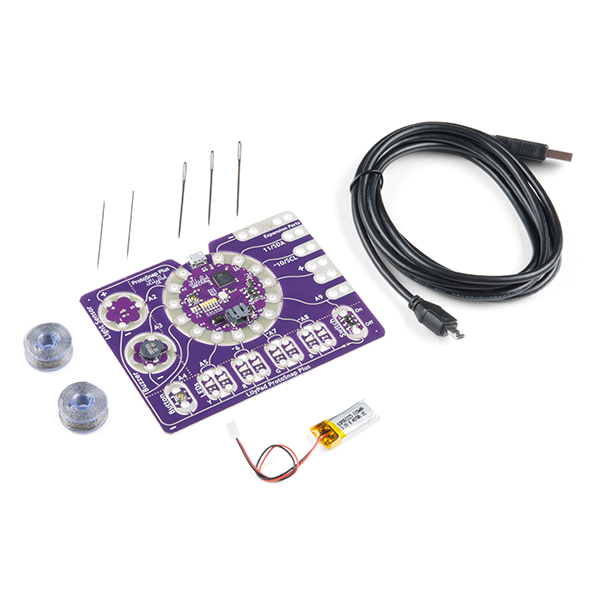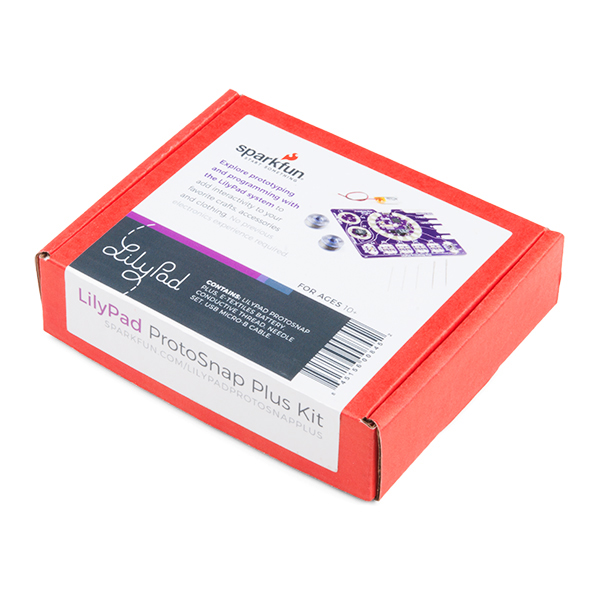LilyPad ProtoSnap Plus Kit
The LilyPad ProtoSnap Plus Kit is an all-in-one e-textile prototyping kit that has been specifically designed to make it as easy as possible to incorporate electronics into any of your garments or fabrics. The included LilyPad ProtoSnap Plus is a sewable electronics powerhouse that you can use to explore circuits and programming, then break apart to make an interactive fabric or wearable project. We have also included a USB cable, 110mAh LiPo battery, needle set and two conductive thread bobbins. With all of these parts combined and the featured Activity Guide (found in the Documents tab), you will be able to plan and create fantastic projects in no time!
At the center of the ProtoSnap Plus is the LilyPad USB Plus microcontroller, pre-wired to a LilyPad board including a LilyPad Light Sensor, LilyPad Buzzer, LilyPad Button Board, four pairs of colored LilyPad LEDs and a LilyPad Slide Switch. Because these components are connected together on the ProtoSnap board, you can test out your project ideas before you sew. The ProtoSnap Plus also includes expansion ports that let you sew your wearables together or use alligator cables to easily connect external sensors and components. After testing out your coding ideas using the attached LilyPad pieces, you can break apart the prototyping board and sew them into your project!
We have also written an online Activity Guide that teaches you how to program in Arduino with the LilyPad ProtoSnap Plus. This guide includes 10 example activities that use the pre-wired LilyPad boards on the LilyPad ProtoSnap Plus after you've completed the Hookup Guide linked below and in the Documents tab.
Please be aware that the Lilypad ProtoSnap Plus Kit is NOT supported on Windows 7/8 due to a lack of support drivers for those specific OS's.
Note: A portion of this sale is given back to Dr. Leah Buechley for continued development and education in e-textiles and also to Arduino LLC to help fund continued development of new tools and new IDE features.
Note: Due to the requirements of shipping the battery in this kit, orders may take longer to process and therefore do not qualify for same-day shipping. Additionally, these batteries cannot be shipped via Ground or Economy methods to Alaska or Hawaii. Sorry for any inconvenience this may cause.
Included on the ProtoSnap:
- 1x LilyPad USB Plus
- 1x LilyPad Light Sensor
- 1x LilyPad Buzzer
- 1x LilyPad Button
- 1x LilyPad Switch
- 2x LilyPad LED --- Yellow
- 2x LilyPad LED --- Red
- 2x LilyPad LED --- Green
- 2x LilyPad LED --- Blue
- 5x Expansion Ports
Kit Also Includes:
- 2x Conductive Thread Bobbin
- 1x Needle Set
- 1x 110mAh LiPo Battery
- 1x USB micro-B Cable --- 6 Foot
- Circuit 1: Blinking LEDs
- Circuit 2: Basic Color Mixing
- Circuit 3: Custom Color Mixing
- Circuit 4: Fading LEDs
- Circuit 5: Play a Tune
- Circuit 6: Buttons and Switches
- Circuit 7: Sensing Light
- Circuit 8: LED Bar Graph
- Circuit 9: Theremin Project
- Circuit 10: Twinkling Night Light Project
LilyPad ProtoSnap Plus Kit Product Help and Resources
LilyPad Vibe Board Hookup Guide
January 16, 2019
The LilyPad Vibe Board is a small vibration motor that can be sewn into projects with conductive thread and controlled by a LilyPad Arduino. The board can be used as a physical indicator on clothing and costumes for haptic feedback.
LilyPad ProtoSnap Plus Hookup Guide
October 5, 2017
The LilyPad ProtoSnap Plus is a sewable electronics prototyping board that you can use to learn circuits and programming with Arduino, then break apart to make an interactive fabric or wearable project.
Getting Started with LilyPad
October 27, 2017
An introduction to the LilyPad ecosystem - a set of sewable electronic pieces designed to help you build soft, sewable, interactive e-textile projects.
LilyPad ProtoSnap Plus Activity Guide
December 7, 2017
Learn how to program in Arduino with the LilyPad ProtoSnap Plus. This guide includes 10 example activities that use the pre-wired LilyPad boards on the LilyPad ProtoSnap Plus.
LilyPad USB Plus Hookup Guide
June 7, 2018
The LilyPad USB Plus is a sewable microcontroller that you can use with Arduino.
Adapting LilyPad Development Board Projects to the LilyPad ProtoSnap Plus
May 24, 2018
An overview of the updates made in the redesign of the LilyPad Development Board to the LilyPad ProtoSnap Plus and how to adapt code written for the old board to the new one.
Core Skill: DIY
Whether it's for assembling a kit, hacking an enclosure, or creating your own parts; the DIY skill is all about knowing how to use tools and the techniques associated with them.
Skill Level: Noob - Basic assembly is required. You may need to provide your own basic tools like a screwdriver, hammer or scissors. Power tools or custom parts are not required. Instructions will be included and easy to follow. Sewing may be required, but only with included patterns.
See all skill levels
Core Skill: Programming
If a board needs code or communicates somehow, you're going to need to know how to program or interface with it. The programming skill is all about communication and code.
Skill Level: Rookie - You will need a better fundamental understand of what code is, and how it works. You will be using beginner-level software and development tools like Arduino. You will be dealing directly with code, but numerous examples and libraries are available. Sensors or shields will communicate with serial or TTL.
See all skill levels
Core Skill: Electrical Prototyping
If it requires power, you need to know how much, what all the pins do, and how to hook it up. You may need to reference datasheets, schematics, and know the ins and outs of electronics.
Skill Level: Rookie - You may be required to know a bit more about the component, such as orientation, or how to hook it up, in addition to power requirements. You will need to understand polarized components.
See all skill levels
Comments
Looking for answers to technical questions?
We welcome your comments and suggestions below. However, if you are looking for solutions to technical questions please see our Technical Assistance page.
Customer Reviews
4 out of 5
Based on 2 ratings:
I love the hardware. I just wish there were more online instructions for advanced wearable electronics projects. I have done lots of looking online for sketches, circuitry, and programming examples. Flora and Gemma projects have lots of examples, so i am trying to learn the differences and apply those projects to Lilypad boards and figure out the differences!
Great product
Works great. My only complain is that the circular processor PCB is too big. It has many extra LEDs that I don't see using (or being able to use) on clothes. I would rather have a small simple PCB for that. Yes, you can buy a simpler one separately, but this is not small.


